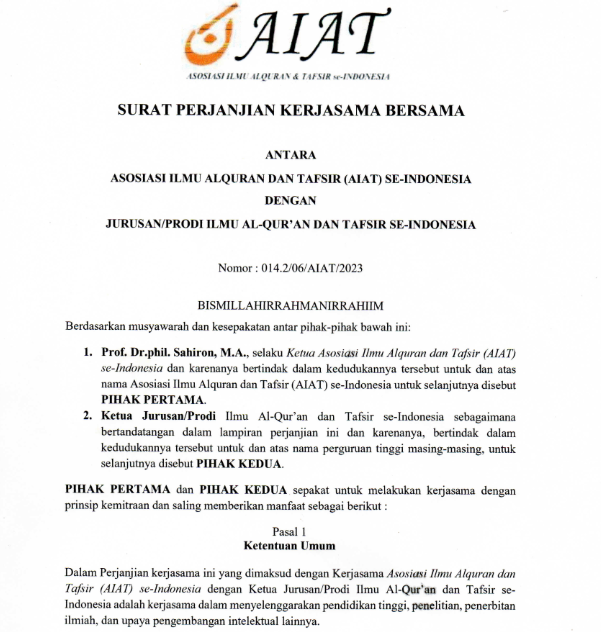Tafsir Otentik dan Tafsir Infiltratif: Studi Kritis dalam Metodologi Tafsir
 Abstract views: 504
,
Abstract views: 504
,
 PDF downloads: 748
PDF downloads: 748
Abstract
Al-Qur'an is the word of God which is the source of Islamic teachings in various dimensions of life, such as legal, social, worship, and so on. The verses of the Qur'an cannot always be understood or interpreted explicitly, sometimes the implied meaning is more substantive than the explicit meaning. To understand the meaning of the Qur'an implicitly requires special knowledge, namely the science of interpretation and other supporting prerequisite sciences. A meaning that is close to the truth can be obtained from the holy text of the Qur'an. Basically, the method of interpreting the Koran is divided into two, namely the interpretation of bi al-ma'tsur and the interpretation of bi al-ra'yi. Tafsir bi al-ma'tsur is a method of interpretation that is based on the Qur'an, as-Sunnah, the words of the Prophet’s companions and tabiin. Meanwhile, the interpretation of bi al-ra'yi is based on the scholar's ijtihad. Interpretation based on religious sources, which spirit and breath are based on the Qur'an, as-Sunnah, the words of the prophet’s companions or tabiin are referred to al-ashil (authentic interpretation). Meanwhile, al-dakhil (deviation interpretation) is a false interpretation because it does not contain interpretation elements outlined by salafussholeh or deviations in interpretation.
Downloads
References
Al-Qur’an Terjemah Bahasa Indonesia. Kudus: Menara Kudus, 2006.
Hamtu, ‘Ammad Ya’qub. “ar-Riwayah al-Wahiyah wa ‘Alaqotuha fi ‘Ilmi al-tafsir”, Majalah Kampus Palestin, Juli 2013.
Husain (al), Abdul Qadir Muhammad. Tamyizu at-Tadkhil fi Tafsiri Al-Qur’ani al-Karimi, tt.
Islam, Ahmad Fakhruddin Fajrul. “ad-dakhĭl fĭ at-tafsĭr: Studi Kritis dalam Metodologi Tafsir”, Tafaqquh, Vol. 2 No. 2, Desember 2014.
Muhammad, Sa’id. “Tanqiyatu al-tafsir min ad-dakhĭl”, Dirosah Da’awiyah, Vol. 6. tt.
Munawwir, Ahmad Warson. al-Munawwir: Kamus Arab – Indonesia. Surabaya: Pustaka Progressif, 1997.
Muttaqin, Khairul. “KONSEP HIDÂYAH DALAM TAFSÎR AL-QUR’ÂN BÎ AL-IMLÂ’ KARYA KIAI ZAINÎ MUN’ÎM.” REVELATIA: Jurnal Ilmu al-Qur’an and Tafsir, http://ejournal.iainmadura.ac.id/index.php/revelatia/article/view/3158, Vol. 1 No 1, 2020.
Najar (al), Jamal Mushthafa Abdul hamid Abd Wahab. Ushulu ad-Dukhuli fi Tafsiri ai at-Tanzili. Al-Azhar, 2001.
Nur, Afrizal. “Infiltration of Shia: Segmentation of Al-Dakhiil in Intrepretation of Al-Mishbah”, dalam Jurnal Ushuluddin , Vol. 23 No. 1, Juni 2015.
Qattan (al), Manna’ Khalil. Studi Ilmu-ilmu Al-Qur’an, Terj. Mudzakkir As. Bogor: Pustaka Litera AntarNusa, 2013.
Roswan Rio Utomo, dkk“View of TAFSĪR TAHLĪLĪ (INTERPRETASI ANALITIS) QS. AL-FURQĀN [25]: 1-11,” 92, diakses 13 Mei 2023, http://ejournal.iainmadura.ac.id/index.php/revelatia/article/view/4488/2509.
Samsurrohman. Pengantar Ilmu Tafsir. Jakarta: Amzah, 2014.
Shihab, M. Qurays. Membumikan Al-Qur’an Jilid 2. Jakarta: Lentera Hati, 2010.
Ulinnuha, Muhammad, 2019. Metode kritik Ad-dakhĭl Fit Tafsir. Jakarta: PT. Media Kreativa.
Zenrif, M.F. Sintesis Paradigma Studi Al-Qur’an. Malang: UIN-Malang Perss, 2008.
The journal operates an Open Access policy under a Creative Commons Non-Commercial Share-Alike license. All articles published Open Access will be immediately and permanently free for everyone to read and download.
• Creative Commons Attribution-NonCommercial (CC-BY-NC)

Revelatia: Jurnal Ilmu al-Qur`an and Tafsir by http://ejournal.iainmadura.ac.id/index.php/revelatia is licensed under a Creative Commons Attribution-NonCommercial 4.0 International License.
Based on a work at http://ejournal.iainmadura.ac.id.





















